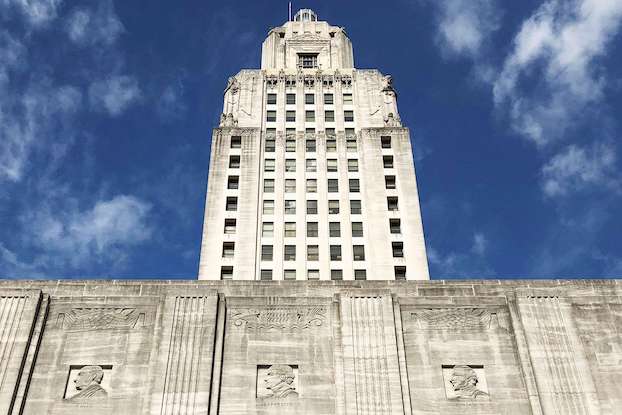Forms, philosophies of government defined
Published 12:18 pm Monday, March 7, 2016
<span style="font-weight: bold; font-family: ‘Lucida Sans’;" class="R~sep~ACopyBody">What is a socialist?</span>
<span class="R~sep~ACopyBody">A socialist is an adherent of socialism, which is a political philosophy that calls for public ownership of the means of production and advocates a more equitable and just distribution of labor and wealth.</span>
<span class="R~sep~ACopyBody">Other forms and philosophies of government, as defined by the CIA World Factbook:</span>
<span class="R~sep~ACopyListing">Authoritarian — a form of government in which state authority is imposed onto many aspects of citizens’ lives.</span>
<span class="R~sep~ACopyListing">Communist — a system of government in which the state plans and controls the economy and a single — often authoritarian — party holds power; state controls are imposed with the elimination of private ownership of property or capital while claiming to make progress toward a higher social order in which all goods are equally shared by the people (i.e., a classless society).</span>
<span class="R~sep~ACopyListing">Democracy — a form of government in which the supreme power is retained by the people, but which is usually exercised indirectly through a system of representation and delegated authority periodically renewed.</span>
<span class="R~sep~ACopyListing">Democratic republic — a state in which the supreme power rests in the body of citizens entitled to vote for officers and representatives responsible to them.</span>
<span class="R~sep~ACopyListing">Islamic republic — a particular form of government adopted by some Muslim states; although such a state is, in theory, a theocracy, it remains a republic, but its laws are required to be compatible with the laws of Islam.</span>
<span class="R~sep~ACopyListing">Marxism — the political, economic, and social principles espoused by 19th century economist Karl Marx; he viewed the struggle of workers as a progression of historical forces that would proceed from a class struggle of the proletariat (workers) exploited by capitalists (business owners), to a socialist “dictatorship of the proletariat,” to, finally, a classless society — Communism.</span>
<span class="R~sep~ACopyListing">Marxism-Leninism — an expanded form of communism developed by (Vladimir) Lenin from doctrines of Karl Marx; Lenin saw imperialism as the final stage of capitalism and shifted the focus of workers’ struggle from developed to underdeveloped countries.</span>
<span class="R~sep~ACopyListing">Oligarchy — a government in which control is exercised by a small group of individuals whose authority generally is based on wealth or power.</span>
<span class="R~sep~ACopyListing">Parliamentary democracy — a political system in which the legislature (parliament) selects the government — a prime minister, premier, or chancellor along with the cabinet ministers — according to party strength as expressed in elections; by this system, the government acquires a dual responsibility: to the people as well as to the parliament.</span>
<span class="R~sep~ACopyListing">Republic — a representative democracy in which the people’s elected deputies (representatives), not the people themselves, vote on legislation.</span>
<span class="R~sep~ACopyListing">Totalitarian — a government that seeks to subordinate the individual to the state by controlling not only all political and economic matters, but also the attitudes, values, and beliefs of its population.</span>
<span class="R~sep~ACopyBody">Incidentally, Democratic presidential candidate Bernie Sanders has described himself as a democratic socialist, a term that refers to someone who believes in principles associated with both democracy and socialism.</span>
<span class="R~sep~AZaphdingbatdot7pt">l</span>
<span style="font-weight: bold;" class="R~sep~ACopyEditors~sep~endnote">Online:</span> <span class="R~sep~ACopyEditors~sep~endnote">www.cia.gov/library/publications/the-world-factbook.</span>
<span class="R~sep~AZaphdingbatdot7pt">l</span>
<span style="font-size: 8pt;" class="R~sep~ACopyEditors~sep~endnote">The I</span><span style="font-size: 8pt;" class="R~sep~ACopyEditors~sep~endnote">nform</span><span style="font-size: 8pt;" class="R~sep~ACopyEditors~sep~endnote">er answers questions from rea</span><span style="font-size: 8pt;" class="R~sep~ACopyEditors~sep~endnote">ders each Sunday, Monday a</span><span style="font-size: 8pt;" class="R~sep~ACopyEditors~sep~endnote">nd Wednesday. It is re</span><span style="font-size: 8pt;" class="R~sep~ACopyEditors~sep~endnote">searched and written by</span> <span style="font-weight: bold; font-size: 8pt;" class="R~sep~ACopyEditors~sep~endnote">Andrew Perzo</span><span style="font-size: 8pt;" class="R~sep~ACopyEditors~sep~endnote">, an</span> <span style="font-style: italic; font-size: 8pt;" class="R~sep~ACopyEditors~sep~endnote">American Press</span> <span style="font-size: 8pt;" class="R~sep~ACopyEditors~sep~endnote">staff wri</span><span style="font-size: 8pt;" class="R~sep~ACopyEditors~sep~endnote">ter. To ask a question, call</span> <span style="font-size: 8pt;" class="R~sep~ACopyEditors~sep~endnote">494-409</span><span style="font-size: 8pt;" class="R~sep~ACopyEditors~sep~endnote">8 and leave voice mail, or ema</span><span style="font-size: 8pt;" class="R~sep~ACopyEditors~sep~endnote">il informer@americanpress.com.</span>





